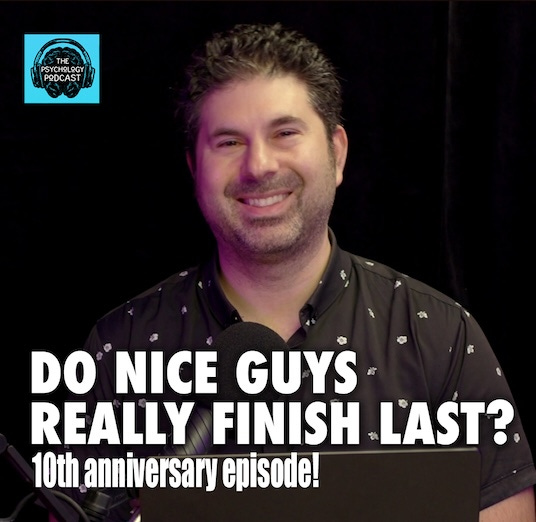Do Nice Guys Really Finish Last?
The science behind this age-old question.
I’d like to reflect for a moment on the fact that this is the 10th anniversary episode of The Psychology Podcast. It’s crazy to even think about. There is nothing else in my life I’ve done every single week for the past 10 years so consistently. My initial motivation for doing this podcast was simply to put a microphone on people in my field and shine a spotlight on their amazing research. I’ve learned so much about psychology over the years from these incredible guests and I hope you have learned a lot as well. I truly hope this podcast has brought you all value.
For this special 10th anniversary episode I thought I’d do something a little different and fun. I’ll be doing a deep scientific dive trying to answer the age-old question: Do nice guys really finish last?
In recent years, a good bit of scientific research has been conducted on this topic, both directly and indirectly. In this special episode of The Human Potential Lab Series of The Psychology Podcast we will explore this fascinating topic in a number of ways, drawing on many different literatures.
We all know someone who is the classic bad boy: charming, rebellious, selfish, thrill seeking, impulsive, and with a long list of sexual encounters and heartbreaks left in his path. Such depictions of the edgy guy with women all around him appear widely in popular culture, from James Dean to James Bond. The undeniable mating success of the bad boy has motivated many nice guys throughout the course of human evolution to gel their hair, put on leather jackets, and attempt to change their congenial ways.
Today, there exists a wide assortment of dating coaches and “pick-up artists” available to teach the frustrated male how to adopt the attractive traits of the bad boy. And there’s no denying that bad boys can be attractive. The traits that bad boys tend to display (at least at first), such as good style, assertiveness, confidence, creativity, humor, charisma, high energy, and good social skills, are all attractive courtship displays.
But what do women really like about the bad boy? Is it the selfish, aggressive aspects, or the attractive traits that come along for the ride? Do bad boys have more sexual partners because of their higher sex drive, lower self-control, aggressiveness, and persistent tactics, or because of their attractive traits? Or is it a bit of a mix of all these qualities? Is it necessary for the “nice guy” to be bad to obtain his mating goals in life? Can he just work on being a genuinely higher mate value man? What does it even mean to be “bad”? What does it mean to be a “nice guy”?
I know, I have a lot of questions. Admittedly, I’ve thought about this topic for quite some time and I’m looking forward to reviewing all the evidence with you to get to the bottom of this age old mystery. See the full episode below and let me know what you think in the comments.
You can listen to the audio-only version wherever you get your podcasts (Apple, Spotify, iHeartRadio). If you enjoy listening to my podcast, please consider writing a positive 5-star review on Apple. It would mean a lot to me!



Happy aniversary!